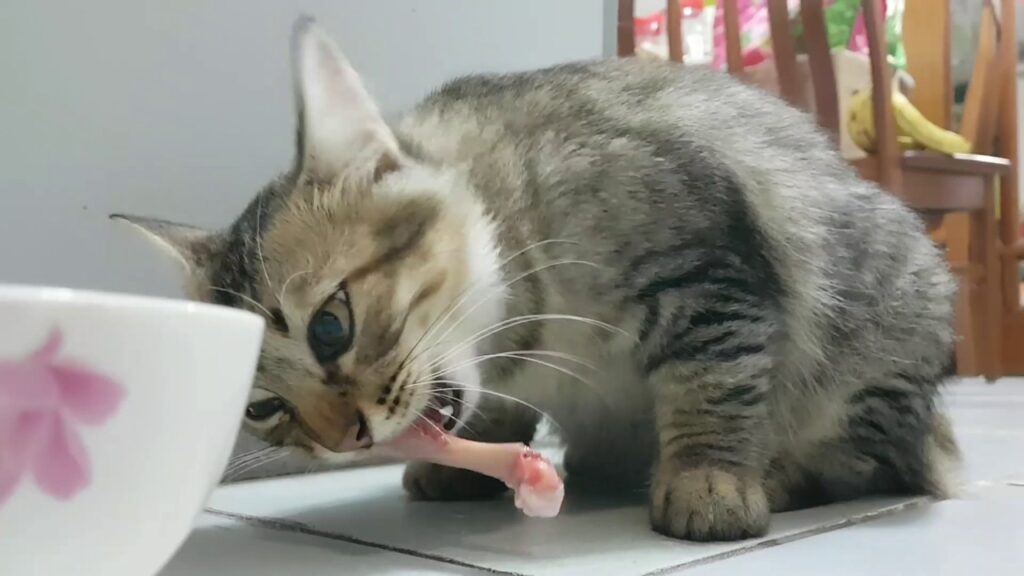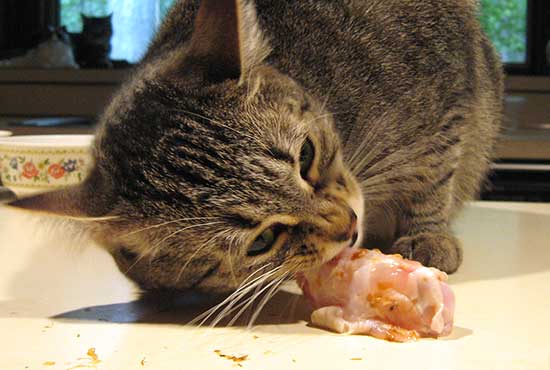Like dogs, cats have a natural instinct to chew. Well, the behavior is not as intense in felines but it’s not uncommon as well.
In the wild, these little creatures have to hunt for food. Once they catch it, they will kill it and disassemble it into smaller bits.
There’s a lot of chewing involved in the actual eating and exploration of prey. This can easily flow over to other areas of the cat’s life, even if she’s domesticated.
Your kitty can chew anything from a plastic bag to wood to wires and certain fabric types.
If you have a dog bone lying around, it is tempting to let your feline friend have a go at it when she shows any signs of wanting to chew.
But is it safe? Can cats really chew on dog bones?
Do Cats Really Need Chew Bones?
Meaty bones have plenty of benefits to cats. For one, they contain live enzymes. As your cat chomps on them, the live enzymes find their way to her gut thereby killing hazardous bacteria.
Raw bones also help with dental care. They get rid of marrow and cartilage thereby removing plaque and tartar from their teeth.
Since bones have calcium, they can help prevent calcium deficiency in felines.
Finally, bone chews also help your cat to have mental and physical stimulation.
Are Dog Bones Safe For Cats?

Cats are carnivorous in nature known for devouring their prey, including bones.
There’s no reason why dog bones would prove to be harmful to our feline companions.
Raw bones don’t have any ill effects on their system at all.
So, yes, you can let your adorable feline friend kill time by chewing on your dog’s bones.
She will have so much fun exploring the bone with his mouth.
Of course, you want to make sure that the dog is far away from the cat as she devours her bone.
You don’t want to spark an unnecessary fight between your pets over bone treats.
Additional Tips
While dog bones are totally safe for cats, there are a few things to consider. These include the following:
I. Stay Away From Cooked Bones
Just like you should never feed your doggie-cooked bones, you should do the same for your kitty.
When cooked, bones become brittle and have a higher chance of splintering.
Small, sharp bones are bound to cause a host of digestive issues. They can physically injure the gut or make it hard to be digested.
II. Start Slow
After realizing that you own a chewer, always seek to find out how aggressive (or otherwise) she is.
The best way is to give her a soft and tiny bone like chicken neck. If she can stand up to that, you can try harder raw bones as long as they can be broken down and digested by the body.
Don’t make them too hard though; their jaws are not as strong as those of your dog.
III. Size Matters
Small cats need equally smaller bones while bigger cats can handle bigger pieces.
If you have a big girl for a cat, don’t shy away from giving her big bones like chicken backs and turkey pieces. They actually need those extra calories from the big bones.
Plus, their slightly larger mouths can handle the size. Else, if you have a small breed, stick to chicken necks and such.
IV. Supervise
Bones may be safe for cats but something can go wrong. As a result, never feed your cat a dog bone without human supervision.
Closing Thoughts
A cat can safely handle dog bones. As long as it is appropriately sized and uncooked, she should be fine having it.
However, you may want to stick around as she chews on it. In case of an unforeseen accident, you can swoop in and rusher to the emergency room.

Hi! I am Eleanor Price. I started this website after my cat, Louie, almost died from a case of botulism (a type of food poisoning often caused by bacteria that grow on food items). Turned out that my cat’s diet was the problem. I have made it my duty to provide the best information and recommendations about everything cat lovers need to know about their felines’ health and wellbeing. My goal is to find the most informative content on anything feline-related and share it with fellow hardworking kitty lovers.

